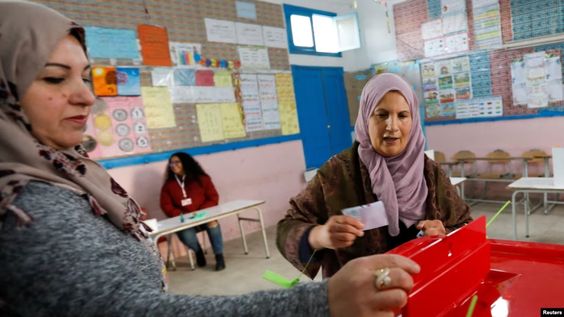Africa
Few People Voted in Tunisia’s Elections Despite an Increase in the President’s Powers

In Tunisia, there was little attendance on Sunday for the runoffs in parliamentary elections after only 11% of eligible voters showed up in the first round in December. Critics of the president claimed that this result refuted his assertions of widespread public support for significant political reform.
The majority of candidates are independents because political parties are abstaining from the election, so attention will likely be focused on whether turnout will be higher than it was in December.
Three hours after voting opened on Sunday, at 11 a.m., the election commission reported a 4.7% turnout. At 10 a.m. in December, it reported a turnout of about 3%.
Because the commission will use Sunday’s total for both rounds of voting, the opposition is worried that the government might try to make the results look better than they are.
Nejib Sahli, 40, of Tunis said as he passed a polling place in the Hay Ettahrir neighbourhood, “I’m not interested in elections that do not touch me.”
A Reuters reporter who was inside the voting place said that no voters showed up during the 20 minutes he was there after the polls had opened.
As part of a reorganised presidential system that he instituted after closing the previous parliament in 2021 and establishing broad control of the state, President Kais Saied has decreed the new, largely powerless, parliament.
Saied’s detractors mocked the incredibly low turnout in the elections in December as proof that his changes are unpopular, accusing him of attempting to undermine the democratic system put in place during the Arab Spring-sparked revolution in Tunisia in 2011.
Only one of the seven men seated and sipping coffee in the Ettahrir cafe suggested he might vote: Mongi Layouni.
“I’m not sure. “I might leave later,” he saidlater,” he said. After Saied’s political reforms, a different man in the cafe, who revealed just his first name as Imad, said he didn’t think his vote mattered.
He said that the president was the only one making decisions. We don’t care about him or his elections, and he doesn’t care about anyone.
Another polling place in the Ettadamon neighbourhood had fewer visible voters as well.
One person, who only gave his name as Ridha, said that he was voting for Saied even though the role of the parliament would be lessened.
He stated, “He is a good man fighting a bad system.”
READ ALSO: Pope Francis will travel to the DR Congo and South Sudan, two fragile countries in Africa
The president has accused his detractors of treason and called for action against them, claiming that his measures have been legitimate and necessary to save Tunisia from years of economic stagnation and political catastrophe.
economic downturn
The widespread dissatisfaction with politics has been exacerbated by the deepening economic crisis, which has led to shortages of some foods and medications and forced the government to seek an international bailout.
The credit rating company Moody’s downgraded Tunisian debt on Friday, stating that the nation would probably default on its sovereign borrowing.
In the former system, the parliament played a leading role in selecting the governments that determined state policy and oversaw the day-to-day operations of the nation. Defense and foreign policy were the only areas where the president had direct control.
Saied’s new regulations subordinate the parliament to the president, who is now in charge of appointing or dissolving administrations. Political parties’ influence is likewise diminished by the regulations, which list parliamentary candidates solely by name without mentioning their party affiliation.
State television has focused more on Sunday’s runoff elections since the December election, notably by holding candidate debates. The opposition claims that this is a strategy the state is using to increase turnout.
Early on Sunday, according to Chahed, an independent election monitoring organisation, there was very little voter turnout. Chahed also reported that some voters were being transported to the polls using local government vehicles.
This week, Maher Jdidi, a representative of the election commission, stated on Shams FM radio that he anticipated a turnout of between 20 and 30%.
From 8 a.m. to 6 p.m., polls are open (0700 GMT–1700 GMT).
Reuters
